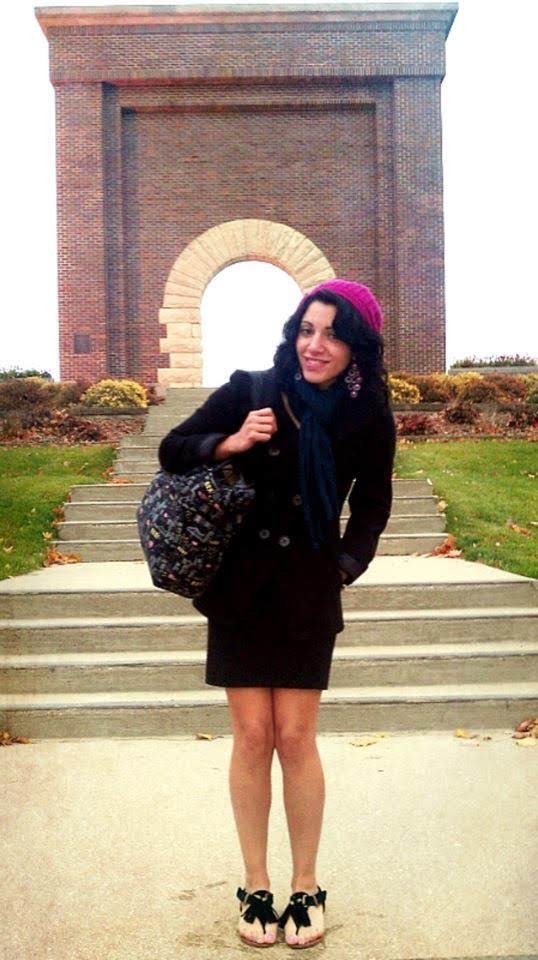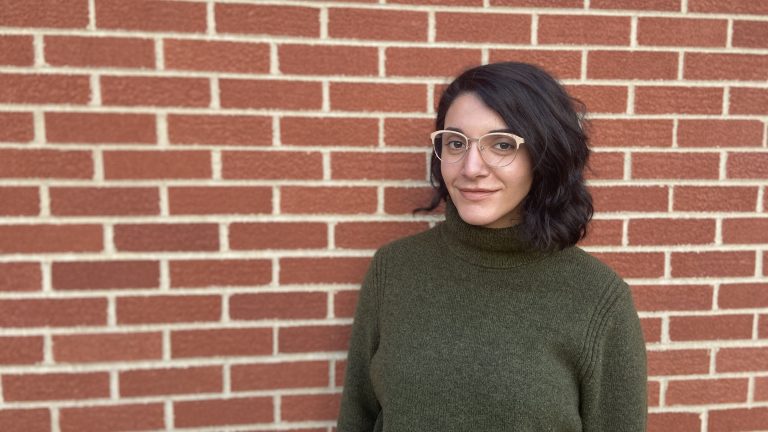Profile Text: Gillian Davis Audio Highlight: Savannah Davis Edited by: Sam Purkiss Photos: Mayra Lopez, Savannah Davis
There are moments when 28-year-old Mayra Lopez questions how integrated immigrants really are in Storm Lake. Diversity is celebrated, but it can feel like “tokenism,” too: a quirk about the town, or an adornment. But this can quickly shift when traveling beyond the city limits. “When I do leave town, oh man, I remember how great we are,” she said. “How wonderful and diverse we are. It takes just, like, an hour being outside of Storm Lake for me to realize that.”
Younger generations like Lopez’s, surrounded by diversity their entire lives, have accepted the multiplicity of cultures and languages in their schools and local businesses. For her, and other young immigrants to small-town America, the “entirely new country that they went to, a country with a new language [and] new cultures,” has always felt like home.
When I do leave town, oh man, I remember how great we are . . . [h]ow wonderful and diverse we are. It takes just, like, an hour being outside of Storm Lake for me to realize that.
At the same time, as she gets older, the question of whether or not to stay in Storm Lake to help it grow—or to move out to more bustling cities with broader opportunities—weighs on her mind.
Lopez has lived in Storm Lake ever since third grade. Deeply entrenched in the Hispanic community and its experiences, she and her family have also witnessed the great transformation in town following INS’s raid on the IBP plant, searching for “illegal immigrants,” in 1996. This change realigned police and city priorities with the needs of all residents.
Once isolated and predominantly white, Storm Lake has been the subject of New York Times profiles, documentaries, and even college classes based on its remarkable demographics. This media attention, welcomed by the community, has created a perception of Storm Lake as a multicultural utopia, one where everyone gets along and all cultures are embraced and accepted. However, this belief belies the fact that the town, like all communities, could do much better.
Lopez has made it her mission as a local Latinx mental healthcare professional to help those who need it in her community. She is a member of SALUD!, a Storm Lake-based non-profit organization dedicated to improving the health of its residents, and of LULAC, a national organization working to advance Hispanic economic standing, protect civil rights, and ensure that housing and health needs are met. “I think the goal is to help Storm Lake be better, cause, I mean, right now we’re doing good. Things are great! But they can be better,” she said. “If Storm Lake was the best, [SALUD!] wouldn’t be meeting…we wouldn’t be doing what we’re doing. There’s still a lot of work to do.”
In a town that prides itself on the diversity of its residents, microaggressions still exist. She describes these as “little annoying, insensitive things” that make stigmatized or culturally marginalized groups question their place in their society. This brand of negativity, and at times xenophobia, became more overt following the election of former President Donald Trump. This manifests as outright hate speech or insensitive language on social media like Facebook. Removal of these “little things,” as Lopez described, would allow people to feel welcome in local stores, rather than to feel on edge due to outward appearances. It would permit students to believe they can do more than just work at factories or other blue-collar positions.
She strives to show that newcomers are not just tokens to make Storm Lake seem progressive, that immigrants are valued members of society. They are professionals and have a voice. They are not just workers in a meatpacking plant. “I feel like Storm Lake is cognizant of diversity,” she said. “We talk about it a lot. We mention it a lot.But community members continue to feel discriminated against based on their skin, their language, or their appearance. Then that means that there is still work to do, right? Just because we have these culturally competent committees, and we invite all the people of color we know to it, doesn’t mean it’s the right way to do it, right? That’s tokenism.” Though new cultures are celebrated, such as with the annual Parade of Nations, Lopez views this with some skepticism. Immigrants can feel perceived as token members of the larger population. She does not want diversity to be celebrated only to make the town’s residents feel proud of their inclusivity rather than to aid the lives of marginalized communities.
I feel like Storm Lake is cognizant of diversity . . . But community members continue to feel discriminated against based on their skin, their language, or their appearance.
The work she does in her social circles allows people to share their ideas and their culture without fear of retaliation. And the hope is that this filters out to the larger population. After all, the town (like other locations in Iowa) could improve by addressing larger systemic issues such as the lack of affordable housing and access to childcare. Storm Lake can improve by having more diverse political representation, with the leaders of its community reflecting a demographic reality where the majority is no longer white. “Our positions of leadership should reflect our diverse community, right?” She said, “If [the] majority is [a] minority, then these positions should have some minorities in them.” Lopez’s inversion of majority/minority here reflects the unique challenges and opportunities that she and other city residents have.
With so much to improve, one questions whether it is worth it for young, upwardly mobile immigrants, and second-generation children, to remain in the city after high school. Lopez is part of a younger generation of Storm Lake immigrants who have faced this difficult question: stay in town with its limited opportunities, or move further away from family? The older generation—many currently or once employed by Tyson or IBP—sacrificed much to afford their children this decision. Can the American Dream be found within the confines of the City Beautiful?
Some young people go to college, leaving Storm Lake for a degree and professional opportunities. However, many stay within the community as workers at the meatpacking plants. That “immigrant” became nearly synonymous with “meatpacker” is the tokenism described by Lopez. Some white residents expect immigrants and ethnic members of the community to achieve the “American Dream” through hard work in the trade or factory fields, not the higher-paying, technically skilled, degree-requisite jobs. Lopez, with LULAC and SALUD!, is trying to subvert this assumption, to remove this inherent bias in the community that sees many immigrant cultures relegated to the background of its economy, even as they form the backbone of it.

Lopez’s current position as a psychotherapist at Plains Area Mental Health Center and as an activist shows a possible path forward, that second-generation residents can find professional fulfillment within the town’s growing economy. The town’s citizens should believe they can readily emulate her and attain professional, highly skilled jobs in Storm Lake.
Even with much to improve, Lopez recognizes the potential of her hometown. One anecdote of hers highlights this fact. On a lunchtime trip to Subway, she saw a young white employee recognize a customer struggling to speak English. The worker then took the order in Spanish. Lopez, after finishing her own lunch, “stayed a little bit and I asked her, ‘Your Spanish was very good. I was about to intercede but you beat me to it. How? Did you learn [Spanish] in high school?’” The employee responded, “‘No, I learned it on my own, in the community, spending time in the community, doing things in the community,’” Lopez recalled. She then said in shock, “‘Are you serious, that’s how you learned it?’ And she was like, ‘Yeah, I have little conversations with different people and that’s kind of how I started picking it up. I just really wanted to learn.’ And I’m like, ‘that is amazing.’”
In Storm Lake, despite its challenges, everyday folks–like Subway employee–can give hope for a future where racism and microaggressions fade. As Lopez said, “Imagine if we have more people like that, who weren’t so centered on their own culture, and their own identity, but were able to take a step back and really appreciate all these other different ethnicities and cultures and all of that. I was just impressed. I mean, if we have more people like her, oh my gosh, Storm Lake would be great.”
